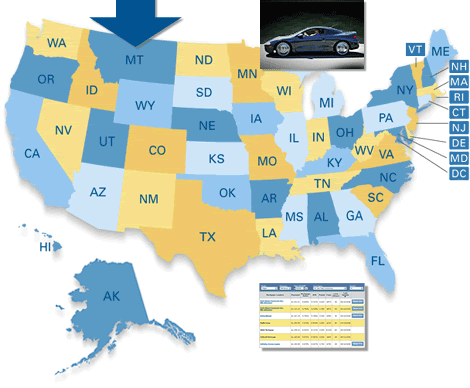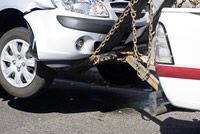Auto insurance settlement advice
by Broderick Perkins
(12/22/2011) ERATE Exclusive - The harried lunch-time rush to the local mall. Screaming kids making a fuss. That mobile phone call you just gotta take.

The holidays create an additional set of driving risks that can lead to fender benders, crack ups or worse in the hundreds of thousands of auto accidents expected this year.
Of course, that's one reason you carry automobile insurance.
To help you make the most of the coverage your carry for your car and its occupants the Consumer Federation of America (CFA) just released "Navigating the Auto Claims' Maze: Getting the Settlement You Deserve"
The American Automobile Association says during the 2011 holiday travel period from Dec. 23, 2011 to Jan. 2, 2012, approximately 83.6 million people will take a trip by automobile of at least 50 miles.
Based on driving records and claims history, CFA estimates that, during the holiday travel period, over 325,000 auto accidents will occur, resulting in 200,000 to 225,000 auto insurance claims filed with the nation's auto insurance companies.
"It's not at all surprising that auto insurers see a spike in claims filed as a result of the holiday season. Almost anyone on the road in December will report seeing an increase in erratic driving patterns due to the added pressures that come with the holidays," said Nancy Osborne, Chief Operating Officer of ERATE, a Santa Clara, CA-based financial information publisher and interest rate tracker.
Osborne added, "Everyone's in a hurry and more distracted than usual, naturally resulting in more accidents occurring."
CFA's consumer guide contains a handy checklist consumers can use to keep track of key information and to make sure they are treated fairly.
"Most people are intimidated when they file an auto insurance claim, perhaps because they have never done it before or are worried about getting less than they deserve for personal injuries or damages to their car," said Mark Romano, CFA's Director of Insurance Claims' Projects.
"Unfortunately, some insurance companies have begun using practices in recent years that can result in an unfairly low settlement for consumers. This guide will walk drivers step-by-step through the claims process and help them avoid mistakes and traps that can lead to an unfair settlement," Romano said.
The guide and checklist provide crucial information that consumers often don't learn until it's too late, including:
• You get to choose where your vehicle is repaired. Your insurer may recommend a repair facility because they have established a money-saving relationship. You can choose to use that facility or one of your own selection.
• You can file a successful claim with the other driver's insurance company, if you were not at fault in the accident. Always get the other driver's insurance and driver's license information at the time of the accident, and if you believe you aren't at fault, don't wait for the other driver to report a claim to his or her insurance company. He or she could delay or fail to report the claim. The other company may or may not pay the claim, but that's why you have your own coverage.
• You can avoid a low-ball offer for injuries sustained in the accident. If your live in a state that does not have a no-fault law (the responsible driver's auto insurance company pays) ask the adjuster if the insurer plans to use a third-party evaluator or injury evaluation software. If the answer is "yes" an attempt at a low-ball offer may be afoot and you should advise the adjuster you will not give the company permission to send your medical records to their parties. This could prevent them from reducing the amount they offer to settle your claim.
• You should know who you should call — and not call -- at your insurance company to resolve claims' problems. Keep a record of all contacts with your adjuster and document all your efforts to resolve problems, but if you aren't satisfied with the adjuster's findings don't appeal to the adjuster's supervisor who is likely to defend the adjuster's position. Seek redress from the head of the office, the manager or director or a regional director. Insurance staff at those levels are more bonus-pay motivated to assist you.
• Know how to get help from auto insurance regulators if your company does not treat you right. Filing a complaint with your state insurance department doesn't mean the department will resolve your complaint, but the department passing the complaint onto the insurer will get you complaint a higher level of attention.
• Protect the privacy of your personal information. You are not obligated to give an insurance adjuster your Social Security number. If you've been injured, rather than sign a medical authorization form that causes you to lose control of medical record privacy, obtain your medical bills and records and remove your Social Security number before handing over the documents.
Other Articles:
Slow down, drive safely, save on auto insurance
Get a CLUE about your home and auto insurance claims
CFA claims auto insurers stiff injured policy holders
Tips on Reducing your Auto Insurance Expenses
Insurance: What You Need to Know Before Filing a Claim
New and Used Auto Loan Rates
Choose Your State Below

Start by selecting your state

Life Insurance
- Term, Whole, Universal, Varialble Life Insurance
- Guidelines for Purchasing Life Insurance
- Life Insurance: Finding the Best Rates
- Life Insurance Explained: Types and Coverage

Medical Insurance
- Health Insurance Basics
- Healthcare Costs and Retirement
- Critical Flaws in HealthCare
- Disability Insurance
- Tips on Buying Long Term Care Insurance
General Insurance Articles

Homeowners Insurance
- Homeowners Insurance Premiums Policy
- Homeowners Insurance: Filing a Claim
- Punxsutawney Phil's forecast-homeowners insurance rates
- Homeowners Insurance Costly Trends
- Home Insurance Costs on the Rise, Coverage Options Decrease
- Homeowners Insurance: The Special Policy for Condo Owners
- Homeowners Insurance College Students Coverage
- Underinsured Homeowners
- Beyond Homeowners Insurance: Coverage for Renters
- What Home Owners Insurance Do You Need? Tips for the Best
- Home Insurance Quotes: Types of Home Owners Insurance
- Home Insurance: How are Insurance Quotes Determined?
- Homeowners Insurance: Finding the Best Quotes


Auto Insurance

- Hitting the brakes on auto insurance costs
- Car Insurance Quotes: Discovering best deals
- Car Ins Quotes: What Factors Determine Rates
- Auto Insurance Quotes and Policies: Commonly Used Terms
- Shopping Prep: What You'll Need to Obtain Car Insurance Quotes
- Auto Insurance Terms & Descriptions
- Understanding Your Auto Insurance Quotes: The 7 Types of Car Insurance
- Auto Insurance - Best Plan for You
- How much Car Insurance to buy
- Need to Know Auto Ins Policy
- Automobile Insurance Settlement Advice
- Managing Auto Insurance: What to Do After an Accident
- Filing a Car Insurance Claim: Steps to Follow after an Accident
- Auto Insurance Steps to Filing a Claim
- Tips - Reducing your Auto Insurance Expenses
- Driving a Hard Bargain
- Slow Down Drive Safely
- Cheapest & Most Expensive Vehicles to Insure
